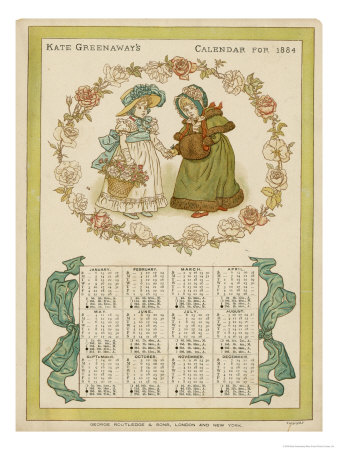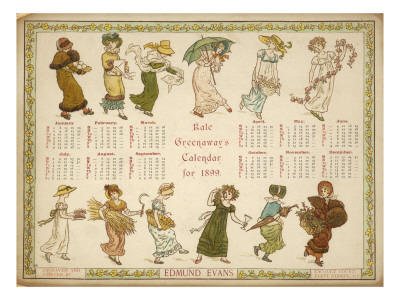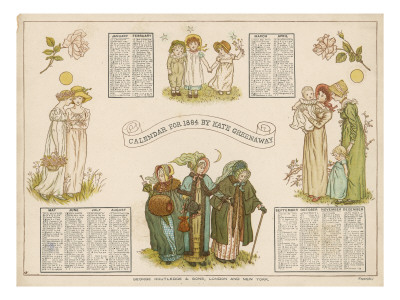A fresh and new year is approaching which marks the perfect "time" to teach your children the calendar and anything else that pertains to months and days. Below is a variety of activities, use what will work best for your classroom...
|
|
Bible/Art: Read the first chapter in Genesis to the children and explain that this is the first week that God created. Have them illustrate what was created on each day by making a "creation week" calendar. You may also download and print the illustration above for classroom decoration.
Basic Skills/Introduction: Read from the picture book, Me Counting Time: From Seconds to Centuries by Joan Sweeney (or anything else you may have or find regarding keeping a calendar). This book is a nice introduction into the concept of time that children will enjoy. Follow this book with a discussion in order to discern what your children know about the calender.
Spelling: Older children can be given a spelling list such as the days of the week or the months of the year depending on their individual levels.
Penmanship/Spelling: Print out our Kate Greenaway penmanship practice booklets. You may choose printing practice or cursive practice depending on the needs of your student. This is a fun addition to this study as your children can color the seasonal drawings as well!
Spelling: Older children can be given a spelling list such as the days of the week or the months of the year depending on their individual levels.
Penmanship/Spelling: Print out our Kate Greenaway penmanship practice booklets. You may choose printing practice or cursive practice depending on the needs of your student. This is a fun addition to this study as your children can color the seasonal drawings as well!
Basic Skills: Beginning with the new year, give a calendar to each child (freebies or dollar store ones are good) or print out our calendar for each child (one month at a time style starting with January). Have your children fill out a square in the calendar daily. For example, January 5th is a Sunday, have your child draw a little symbol that will symbolize the Lord's Day or a day of church attendance. On the next calendar day, which is Monday, they can draw the weather. For instance, if it is cold they can draw clouds. If it is hot then the sun can be drawn in the appropriate square. You basically want them to fill in pertinent information each day so they can see the manner in which time moves. When a month is finished, time to turn the page to the next month and explain that they will begin the cycle with the next month. This will gently teach them how and when a month starts and that there are twelve months in a year and so forth.
Language Arts: Read to your children the following poem ~
The Months
January brings the snow,
Makes our feet and fingers glow.
February brings the rain,
Thaws the frozen lake again.
March brings breezes loud and shrill,
Stirs the dancing daffodil.
April brings the primrose sweet,
Scatters daisies at our feet.
May brings flocks of pretty lambs,
Skipping by their fleecy dams.
June brings tulips, lilies, roses,
Fills the children's hand with posies.
Hot July brings cooling showers,
Apricots and gillyflowers.
August brings the sheaves of corn,
Then the harvest home is borne.
Warm September brings the fruit,
Sportsmen then begin to shoot.
Fresh October brings the pheasents,
Then to gather nuts is pleasent.
Dull November brings the blast,
Then the leaves are whirling fast.
Chill December brings the sleet,
Blazing fire, and Christmas treat.
By ~ Sara Coleridge
Art/Copywork: Have your children do an illustration page for each month from the poem. For instance, in January, have them draw a picture of themselves in a snowy climate. If they are old enough to write then they can label the page "January" and/or copy the verses pertaining to that month from the poem above. For "February" a rainy day page (per the poem above) would be in order and so on. Draw a page a day or a page a week depending on your schedule.
Or, simply print out our copywork booklet featuring this poem along with Kate Greenaway drawings that may be colored as well.
Or, simply print out our copywork booklet featuring this poem along with Kate Greenaway drawings that may be colored as well.
Basic Skills/Poetry: Have your children memorize the following poem (older children may copy it for writing practice):
Thirty days hath September,
April, June, and November.
All the rest have thirty-one;
February stands alone.
Twenty-eight days are his share,
With twenty-nine on each leap year.
Basic Math: After reading the above poem, have your children count the days in each month on their calendar and make sure it matches with the numbers given in the poem above so that they understand the concept. This way they will associate the information given in the poem with how it pertains to the actual calendar.
Happy New Year by Jenny Nystrom
|
Art Appreciation/Picture Study: The above painting by Jenny Nystrom is titled "Happy New Year". See what the children notice about the picture. Ask them the following questions:
- What do they think the family is watching?
- What season does it look like in the picture?
- Does this painting look like it takes place in today's time?
- What objects do they notice in the room?
- Based on the clues in the painting, does this look like an American home?
- Do they like the picture?
January cold desolate;
February all dripping wet;
March wind ranges;
April changes;
Birds sing in tune
To flowers of May,
And sunny June
Brings longest day;
In scorched July
The storm-clouds fly
Lightning-torn
August bears corn.
September fruit;
In rough October
Earth must disrobe her;
Stars fall and shoot
In keen November;
And night is long
And cold is strong
In bleak December.
By ~ Christina Rossetti
Basic Skills: Now that the children are more familiar with the calendar, have them find their birthdays and their family members birthdays and label them.
Movie Night: Younger children will enjoy watching Dinosaurs, Genesis & the Gospel, DVD. How does this pertain to the calendar? The Bible teaches that God made everything "good" in the beginning and in seven days. This video will help to plant the seeds of biblical thinking about the age of the earth to your children.

This post may be shared with some or all of the following link-ups: The Art of Home-Making Mondays, Modest Mom Monday's, Homestead Barn Hop, Monday's Musings, Make Your Home Sing Monday, Marriage Monday, Good Morning Mondays, Titus 2sdays, Titus 2 Tuesdays, Tuesdays with a Twist, Raising Homemakers, Wise Woman Link Up, Wow Us Wednesdays, Wildcrafting Wednesday, The Scoop, Coffee and Conversation, So Much at Home, Homemaking Thursdays, Home Sweet Home, Hearts for Home Thursdays, Home Acre Hop, From the Farm Blog Hop, Farmgirl Friday, Front Porch Friday Blog Hop, Simply Natural Saturdays and Clever Chicks Blog Hop. Thank you lovely ladies for hosting these.












I love those poems! We teach this topic naturally also. It's much more fun for everyone! I will be looking for the farm book you mentioned!
ReplyDeleteThe book is a sweet classic over here :)
DeleteWhat an awesome post filled with great ideas to jump start a teacher of young children! Such foundational thinking/learning should be be fun and visual. I DO wish I could do some of my teaching over ...Haha!!
ReplyDeleteI do too!!! as they keep on introducing new ideas… and I am still in the game :)
DeleteOh I have to do this with my kids. They are trying to figure out the days and months so this would work perfect!! :)
ReplyDeleteOoh, it would be! I hope they enjoy it! :)
DeleteI have been searching your site for some time now. Sometimes it's just for a little inspiration (more motivation) and sometimes for the poetry and beautiful pictures your feature. I am going to use this unit for our "living math" that we are beginning twice a week for this homeschool year. Thank you for the beauty you provide on the net. PS My children love the Peter Rabbit nursery spray and beg me to spray their rooms. Even the 13 year old. :-)
ReplyDeleteOh Jessica, your sweet comment made my day! Thank you!
Delete